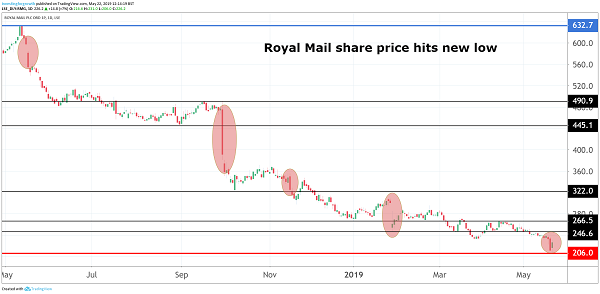Royal Mail dividend goes same way as Vodafone and M&S
Cutting the dividend removes another prop for Royal Mail shares which hit a record low on these results.
22nd May 2019 12:58
by Graeme Evans from interactive investor
Cutting the dividend removes another prop for Royal Mail shares which hit a record low on these results.

These are testing times for income investors, with high-yielding Marks & Spencer (LSE:MKS), Vodafone (LSE:VOD) and now Royal Mail (LSE:RMG) taking the axe to dividend payments in recent weeks.
The trio's respective struggles with competition and urgent need to divert cash flows towards investment mean the dividend decisions by all three companies should come as no surprise, however. In the case of Royal Mail, the rebased dividend will help cover the £1.8 billion the 500-year-old company plans to spend on transforming the UK postal service over the next five years.
The dividend in today's results increased by 1p to 25p a share for the 2018/19 financial year, but this will be rebased by 40% to a minimum of 15p for the next financial year.
But it's not just those investors enticed by the recent 6% dividend yield that will be impacted. Royal Mail is one of the most widely held stocks in the FTSE, including many of the 140,000 postal workers who were given free shares at the time of the privatisation in 2013. Retail investors also received 227 shares from the heavily oversubscribed flotation.
- Income hunters can find great funds on ii's Super 60 recommended list of investments
- Have Royal Mail shares really bottomed after recent crash?
The stock began trading at 330p and shot up to 631p by last May, but it's been downhill ever since as the scale of the challenge facing new chief executive Rico Back became apparent. A "kitchen-sink" profit warning on October 1 was particularly cruel on posties as it came just days before the five-year anniversary of the float, when it would have been possible to sell their holdings without triggering a tax bill.
Shares slid to a new low of 206p in the opening minutes of trading today as the City digested the dividend cut. What's happened subsequently to the shares - up 7% on the day to 226p - at least offers a glimmer of hope that analysts think Back has got the bad news out of the way as he prepares to step up the focus on long overdue productivity and performance gains.

Source: TradingView Past performance is not a guide to future performance
Jefferies said the planned dividend cut was in line with its expectations, with the payment now more in line with free cash flow. They noted that the company's guidance for 2019/20 adjusted operating profits of between £300 million and £340 million compared with consensus expectations of £324 million and today's reported figure of £341 million.
Analysts at Barclays Capital think there's still a small upside in the share price to 250p, having cut their price target from 410p in the wake of today's results. Liberum analyst Gerald Khoo cut from 410p after October's profits warning and continues to think shares are worth 240p.
The question now for investors will be whether the growth driver of UK parcels will be sufficient to offset the structural decline in letters and present Back with more room to complete his ambitious turnaround plan. The group handled around 1.3 billion parcels in the UK in 2018/19 but letters still accounted for 51% of revenues in the UKPIL division.
Back's drive to "future proof" the UK business against the impact of e-commerce and other changes in the way we live our lives is based around the creation of "a parcels-led, more balanced and more diversified international business".
The transformation in the UK will see a renewed focus on service, efficiency and productivity supported by a range of new, digitally enabled tools and targeted investments. The £1.8 billion set aside is on top of the £2.1 billion already invested in the UK since 2013.
Back wants to see a group operating profit margin of over 4% by 2021/22 and in excess of 5% by 2023/24. The figure in 2019/20 fell 200 basis points to 3.6% and is expected to be squeezed in the near term as the restructuring plan gets underway.
Royal Mail said:
"While we expect to handle many more parcels in the years to come, forecasts suggest the number of UK domestic letters in our mail bag will decline by around 26% over the next five years. That is a key imperative for change."
The push towards becoming a parcels-led business will be driven by major new customer and e-retailer initiatives, while the single biggest repurposing of the postbox network for some time will see the introduction of about 1,400 parcel postboxes across the UK.
Royal Mail will also look to boost the scale of GLS, which is one of the largest, ground-based parcel networks in Europe with a growing presence in the US and Canada.
These articles are provided for information purposes only. Occasionally, an opinion about whether to buy or sell a specific investment may be provided by third parties. The content is not intended to be a personal recommendation to buy or sell any financial instrument or product, or to adopt any investment strategy as it is not provided based on an assessment of your investing knowledge and experience, your financial situation or your investment objectives. The value of your investments, and the income derived from them, may go down as well as up. You may not get back all the money that you invest. The investments referred to in this article may not be suitable for all investors, and if in doubt, an investor should seek advice from a qualified investment adviser.
Full performance can be found on the company or index summary page on the interactive investor website. Simply click on the company's or index name highlighted in the article.